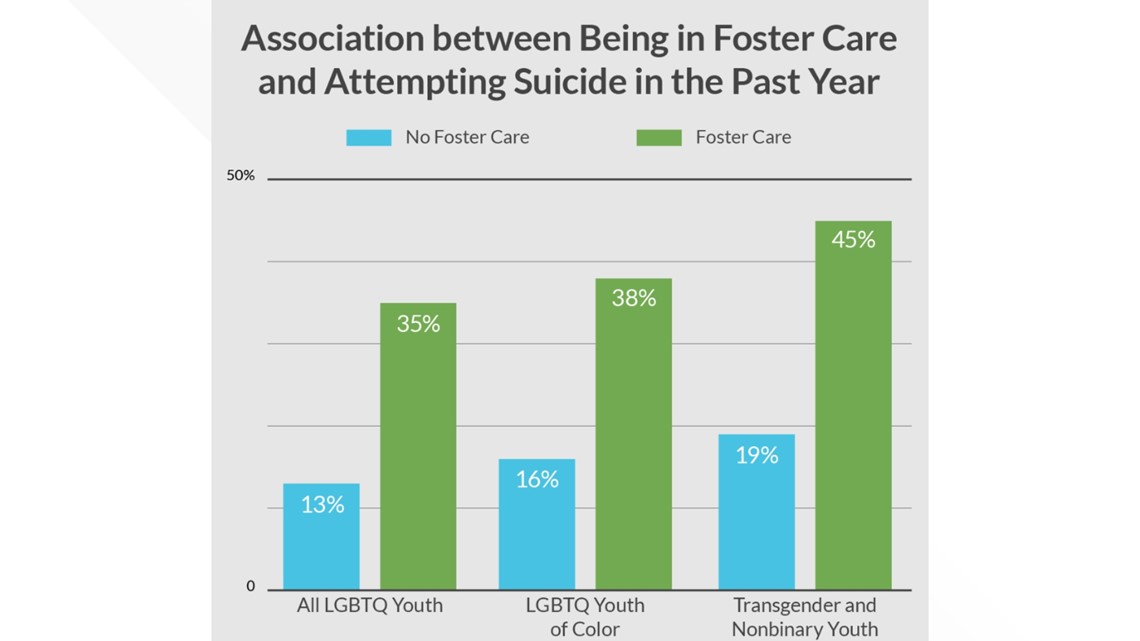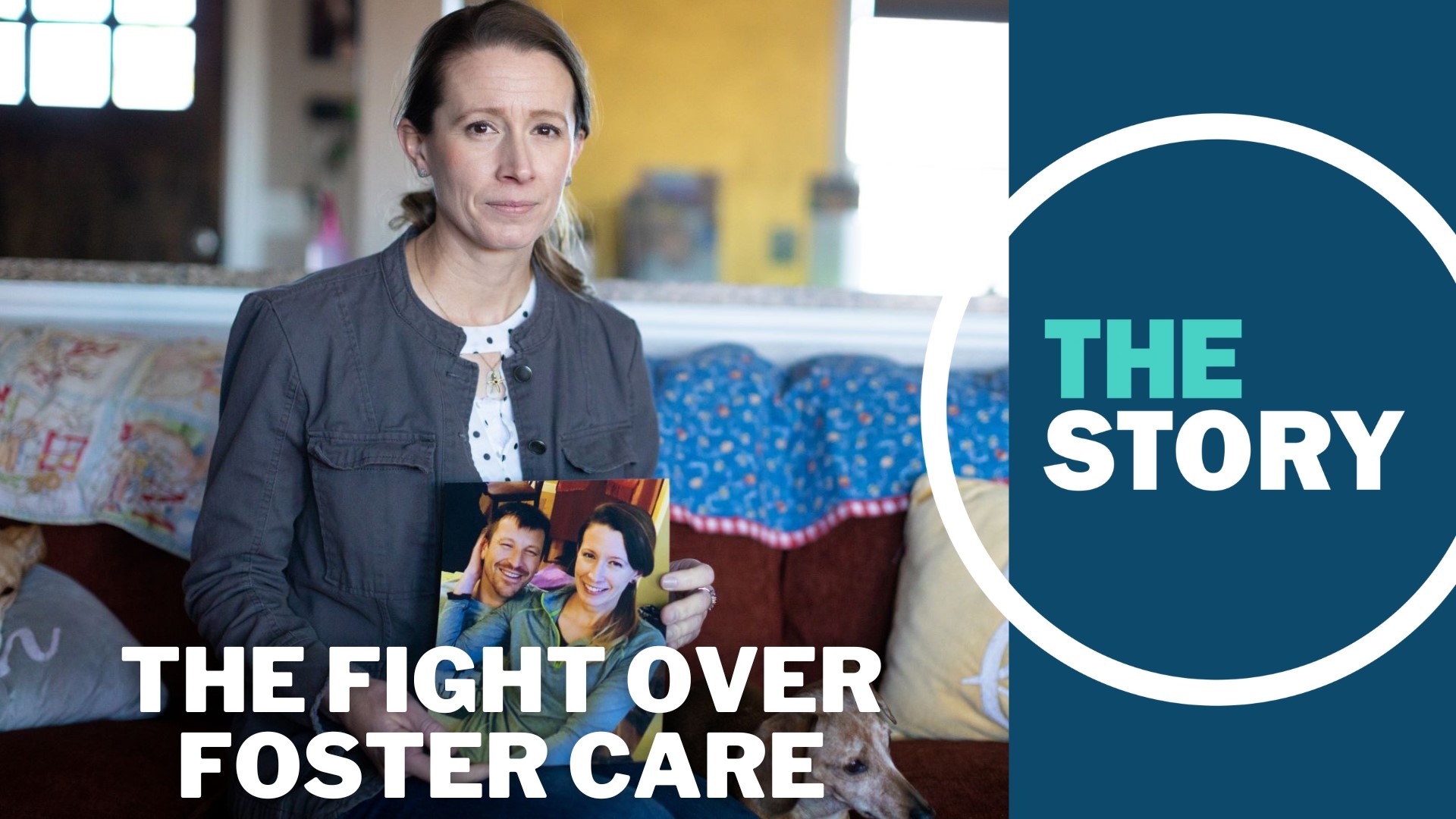BURNS, Oregon — At any given time there are about 5,000 kids in Oregon's foster care system. A mother in Malheur County says that she wants to adopt two of those kids from foster care, but she's been blocked by the state due to a difference in beliefs.
According to Jessica Bates, Oregon turned her down because she disagreed with requirements that she unconditionally accept the sexual orientation or gender identity of her adopted children.
Bates claims the state's requirements are against her religious beliefs — and now she's suing the state.
When Bates' husband died in a car crash in 2017, she became a single mother of five biological kids. She's a Christian, and she said that after listening to the radio one day, God told her to adopt more children.
That revelation led Bates to Oregon's foster care system, where she decided she wanted to adopt two kids — siblings under the age of 9. But when she went to fill out forms for her home evaluation, she got hung up on one section.
Oregon's Department of Human Services requires that certified foster homes "respect, accept and support the race, ethnicity, cultural identities, national origin, immigration status, sexual orientation, gender identity, gender expression, disabilities, spiritual beliefs and socioeconomic status of a child."
DHS requires that adoptive parents meet the current and lifelong needs of a child's physical and emotional safety and well-being. The Oregon Foster Children's Bill of Rights states that children in foster care have the right to determine and express their gender identity, dress themselves accordingly, and have a say over decisions about their body when it comes to medical care.
For LGBTQ rights advocates and for DHS, there's a simple reason for this — acceptance and support can save lives.
However, Bates felt that accepting and supporting different sexual orientations or gender identities would contradict her religious beliefs. She sent a note to DHS and the person handling her application, writing:
"I need to let you know I cannot support this behavior in a child. I have no problem loving them and accepting them as they are, but I would not encourage them in this behavior. I believe God gives us our gender/sex and it's not something we get to choose."
Bates went on to say that providing gender-affirming medical care like hormone injections would be child abuse.
After that, Bates' application to become a foster parent was denied. She's filed a lawsuit against the state in an attempt to get the rule change, represented by the Alliance Defending Freedom — a right-wing law firm that works on Christian religious freedom cases, often in opposition to LGBTQ+ rights.
"Jessica went through the process, and that was the only reason she was excluded," said Jonathan Scruggs, an attorney with the ADF. "She was not excluded because she would not effectively care for children or anything like that. She was excluded because she would not essentially bow down to the state's orthodoxy on this principle that she would not, in theory, say that she would affirm practices and beliefs that she disagreed with, even if the child that she wanted to adopt didn't care about these issues."
'They're going to have their own identity'
To get more context on these requirements, The Story reached out to Basic Rights Oregon, a local advocacy group for LGBTQ+ Oregonians. Blair Stenvick, communications manager for Basic Rights Oregon, is also a foster parent.
"Kids don't need to be walking into something where their identity is going to be politicized, or they're going to try to be forced to fit a mold that they just aren't going to fit into," Stenvick said. "They just need a home that's accepting and affirming and open minded. I think in general, foster parents and adoptive parents need to be open minded, because you're going to be getting a kid who has already been shaped by other environments, outside of your own, and they're going to have their own identity coming into your home. And your job should be to support that and help them become the best version of who they are and can be not force them to mold into who you want them to be."
According to a survey by The Trevor Project, which promotes LGBTQ+ rights, 71% of LGBTQ youth — including 86% of trans and non-binary youth — say state laws restricting the rights of gay young people have negatively impacted their mental health. They also reported that policies banning gender-affirming medical care make them feel angry, stressed, sad, hopeless and scared.


For LGBTQ kids who've gone through the foster care system, the risk is even greater. LGBTQ youth who reported having been in foster care had three times greater odds of reporting a suicide attempt in the past year.
"We know that there's an outsized population of queer and trans kids in foster care. I think, according to one recent study from the University of Maryland looking at national data, it was almost a third of kids in the foster system identify as LGBTQ+," Stenvick said. "So that can be that, you know, kids don't feel accepted in their home, and they might be abused because of that, they might be kicked out or choose to run away. They may — you know, because of their identities and feeling marginalized — seek out drug use or homelessness or other unhealthy things that might lead to them becoming DHS-involved. And so because of that, because there's such a need on top of that, that's why it's doubly important that foster and adoptive families are open and supportive and affirming."
The Story reached out to DHS, and a spokesperson said that they can't comment on the lawsuit. However, they provided the following statement:
"The Child Welfare Division stands in support of transgender, non-binary, gender-fluid and other LGBTQIA2S+ children, young people and families, including those who are in foster care and those who have been adopted.
"At a time when gender-diverse people, policies and laws are under attack, it is important to reinforce our values and practices related to the children and families we serve. We are committed to creating a safe and supportive environment for all children and young people, regardless of their gender identity."

